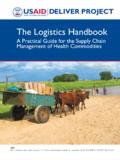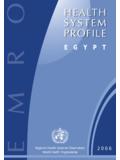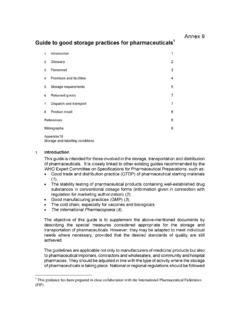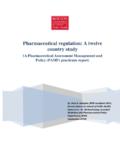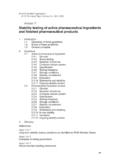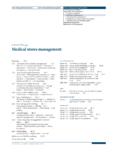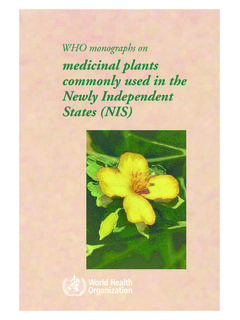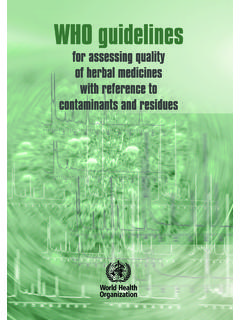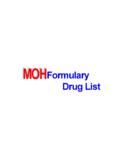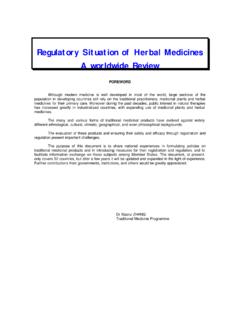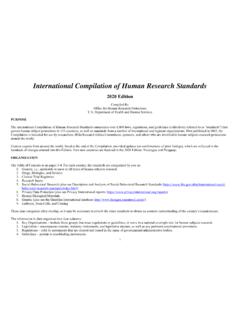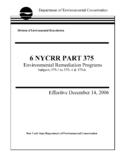Transcription of Strengthening WHO preparedness for and response to health …
1 SEVENTY-FIFTH WORLD health ASSEMBLY A75/18. Provisional agenda item 12 April 2022. Strengthening WHO preparedness for and response to health emergencies Proposal for amendments to the international health regulations ( 2005 ). 1. The Director-General has the honour to submit to the health Assembly for its consideration, in accordance with paragraph 1 of Article 55 of the international health regulations ( 2005 ), the proposal for amendments to the regulations received from the United States of America pursuant to the said provision (see Annex). 2. In accordance with paragraph 2 of Article 55 of the international health regulations ( 2005 ), the Director-General communicated the text of the proposal for amendments to all States Parties to the regulations on 20 January 2022 via circular letter. 3. Pursuant to paragraph 3 of Article 55 of the international health regulations ( 2005 ), any amendments to the regulations adopted by the health Assembly would come into force for all States Parties on the same terms, and subject to the same rights and obligations, as provided for in Article 22.
2 Of the Constitution of WHO and Articles 59 to 64 of the international health regulations ( 2005 ). ACTION BY THE health ASSEMBLY. 4. The health Assembly is invited to consider the proposed amendments to the international health regulations ( 2005 ). A75/18. ANNEX. Annex A75/18. 3. A75/18 Annex 4. Annex A75/18. Submission of the United States of America Proposed Amendments to the international health regulations ( 2005 ). Articles 5, 6, 9, 10, 11, 12, 13, 15, 18, 48, 49, 53, 59. Explanation of changes: The proposed new text is shown in bold underline, and proposed deletions to existing text is shown in strikethrough. All other text would remain unchanged. Article 5: Surveillance 1. Each State Party shall develop, strengthen and maintain, as soon as possible but no later than five years from the entry into force of these regulations for that State Party, the capacity to detect, assess, notify and report events in accordance with these regulations , as specified in Annex 1.
3 This capacity will be periodically reviewed through the Universal health Periodic Review mechanism. Should such review identify resource constraints and other challenges in attaining these capacities, WHO. and its Regional Offices shall, upon the request of a State Party, provide or facilitate technical support and assist in mobilization of financial resources to develop, strengthen and maintain such capacities. New 5. WHO shall develop early warning criteria for assessing and progressively updating the national, regional, or global risk posed by an event of unknown causes or sources and shall convey this risk assessment to States Parties in accordance with Articles 11 and 45 where appropriate. The risk assessment shall indicate, based on the best available knowledge, the level of risk of potential spread and risks of potential serious public health impacts, based on assessed infectiousness and severity of the illness. Article 6: Notification 1.
4 Each State Party shall assess events occurring within its territory by using the decision instrument in Annex 2 within 48 hours of the National IHR Focal Point receiving the relevant information. Each State Party shall notify WHO, by the most efficient means of communication available, by way of the National IHR Focal Point, and within 24 hours of assessment of public health information, of all events which may constitute a public health emergency of international concern within its territory in accordance with the decision instrument, as well as any health measure implemented in response to those events. If the notification received by WHO involves the competency of the international Atomic Energy Agency (IAEA), the Food and Agriculture Organization (FAO), the World Organisation for Animal health (OIE), the UN Environment Programme (UNEP) or other relevant entities, WHO shall immediately notify the IAEA relevant entities.
5 2. Following a notification, a State Party shall continue to communicate to WHO, by the most efficient means of communication available, timely, accurate and sufficiently detailed public health information available to it on the notified event, where possible including genetic sequence data, case definitions, laboratory results, source and type of the risk, number of cases and deaths, conditions affecting the spread of the disease and the health measures employed; and report, when necessary, the difficulties faced and support needed in responding to the potential public health emergency of international concern. 5. A75/18 Annex Article 9: Other reports 1. WHO may take into account reports from sources other than notifications or consultations and shall assess these reports according to established epidemiological principles and then communicate information on the event to the State Party in whose territory the event is allegedly occurring.
6 Before taking any action based on such reports, WHO shall consult with and attempt to obtain verification from the State Party in whose territory the event is allegedly occurring in accordance with the procedure set forth in Article 10. To this end, WHO shall make the information received available to the States Parties and only where it is duly justified may WHO maintain the confidentiality of the source. This information will be used in accordance with the procedure set forth in Article 11. Article 10: Verification 1. Within 24 hours of receiving information, WHO shall request, in accordance with Article 9, verification from a State Party of reports from sources other than notifications or consultations of events which may constitute a public health emergency of international concern allegedly occurring in the State's territory. In such cases, WHO shall inform the State Party concerned regarding the reports it is seeking to verify.
7 2. Pursuant to the foregoing paragraph and to Article 9, each State Party, when requested by WHO, shall verify and provide: (a) within 24 hours, an initial reply to, or acknowledgement of, the request from WHO;. (b) within 24 hours, available public health information on the status of events referred to in WHO's request; and (c) information to WHO in the context of an assessment under Article 6, including relevant information as described in paragraphs 1 and 2 of that Article. 3. When WHO receives information of an event that may constitute a public health emergency of international concern, it shall offer within 24 hours to collaborate with the State Party concerned in assessing the potential for international disease spread, possible interference with international traffic and the adequacy of control measures. Such activities may include collaboration with other standard- setting organizations and the offer to mobilize international assistance in order to support the national authorities in conducting and coordinating on-site assessments.
8 3bis. Within 24 hours of receiving a WHO offer of collaboration, the State Party may request additional information supporting the offer. WHO shall provide such information within 24. hours. When 48 hours have elapsed since the initial WHO offer of collaboration, failure by the State Party to accept the offer of collaboration shall constitute rejection for the purposes of sharing available information with States Parties under Paragraph 4 of this section. 4. If the State Party does not accept the offer of collaboration within 48 hours, WHO shall may, when justified by the magnitude of the public health risk, immediately share with other States Parties the information available to it, whilst encouraging the State Party to accept the offer of collaboration by WHO, taking into account the views of the State Party concerned. 6. Annex A75/18. Article 11: Provision of information by WHO. 1. Subject to paragraph 2 of this Article, WHO shall send to all States Parties and, as appropriate, to relevant intergovernmental organizations, as soon as possible and by the most efficient means available, in confidence, such public health information which it has received under Articles 5 to 10 inclusive, or which is available in the public domain, and which is necessary to enable States Parties to respond to a public health risk.
9 WHO shall communicate information to other States Parties that might help them in preventing the occurrence of similar incidents. 2. WHO shall use information received under Articles 6, and 8 and paragraph 2 of Article 9 for verification, assessment and assistance purposes under these regulations and, unless otherwise agreed with the States Parties referred to in those provisions, shall not make this information generally available to other States Parties, when until such time as: (a) the event is determined to constitute a public health emergency of international concern in accordance with Article 12; or (b) information evidencing the international spread of the infection or contamination has been confirmed by WHO in accordance with established epidemiological principles; or (c) there is evidence that: (i) control measures against the international spread are unlikely to succeed because of the nature of the contamination, disease agent, vector or reservoir.
10 Or (ii) the State Party lacks sufficient operational capacity to carry out necessary measures to prevent further spread of disease; or (d) the nature and scope of the international movement of travellers, baggage, cargo, containers, conveyances, goods or postal parcels that may be affected by the infection or contamination requires the immediate application of international control measures; or (e) WHO determines it is necessary that such information be made available to other States Parties to make informed, timely risk assessments. 3. WHO shall inform consult with the State Party in whose territory the event is occurring as to its intent to make information available under this Article. 4. When information received by WHO under paragraph 2 of this Article is made available to States Parties in accordance with these regulations , WHO shall make it available to the public if other information about the same event has already become publicly available and there is a need for the dissemination of authoritative and independent information.
